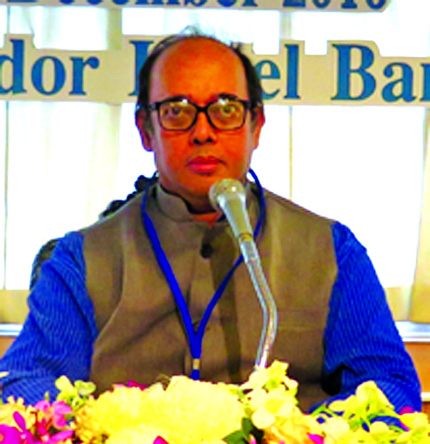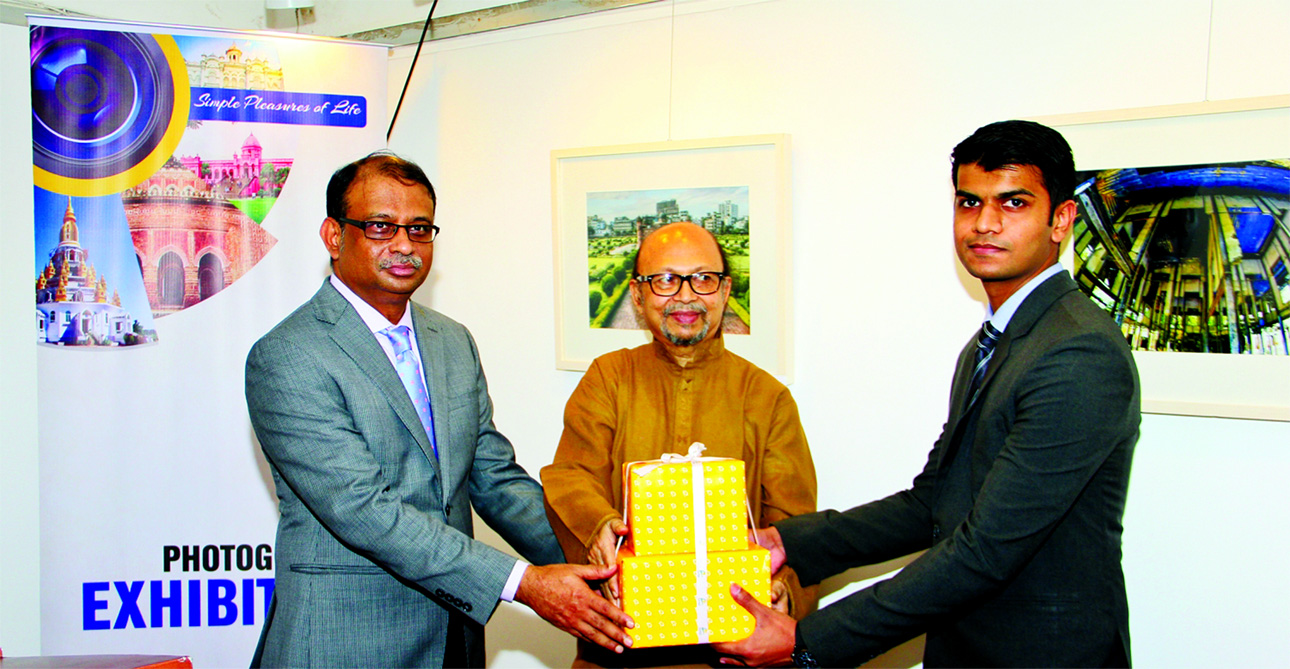IBBL arranges confce on business dev in Bogra
Islami Bank Bangladesh Limited (IBBL) has arranged a conference on business development for its Bogra and Rangpur zones.
Managing Director and CEO of the bank M Abdul Hamid Miah addressed the programme as the chief guest held at a local hotel in Bogra on Friday, said a press release on Saturday.
IBBL Additional Managing Director M Shamsuzzaman and its Deputy Managing Directors Mohammed Monirul Moula and Abu Reza M Yeahia, its Executive Vice Presidents Zafar Alam and Mohammad Qaisar Ali spoke at the function as special guests.
Testing hypothesis on theory of social networking, community banking and empowerment of people: A conceptual view

In future a separate study may be done considering social networking as a dependent variable while another study may be done considering community banking. Independent variables may be social capital, social medial, social business, social education, social entrepreneurship, purchasing capability, adding value, education level, and rise of income level among the people, Further another model can be done considering micro savings while independent variable will be social capital, social networking and community banking, competitive sustainability, efficiency, effectiveness, and micro investment. Through framing questionnaire, the future study may collect data and can do binary logistic regression equation and factor analysis. Otherwise structural equation may be done.
However, this study only develops a proposed model as it is a conceptual study.
Proposed Model
Chart:1 Social Networking Model ,Community Banking and empowerment of people is shown below:
Analysis of the Findings and Discussions
The result from the study tried to describe those people's empowerment which is closely related with Social Networking, Social intelligence and social entrepreneurship along with social capital and social investment all work as a holistic approach. Community bank will help financial inclusion which in turns endorses wide-ranging development, creative ideas and ventures, increasing occupational opportunities and contests lacking by releasing progressive changes for the underprivileged and deprived people of the country with the help of digitalization process. This will also reduce the fraudulent activities of the cooperative banks and fraud syndicates due to lack of proper supervision and monitoring. As such Govt. should take initiatives to set up community banking for the unbanked people at a cheaper rate but effective manner. Acemogluand and Ozdaglar(2009)comment on social and economic networks for improving the livelihood of the people as well as creating employment opportunity is feasible through using social networking and community banking. Social welfare is needed for the betterment of the poorer group of the country. Multilevel marketing (MLM) companies are doing different sorts of fraud by taking greediness and oppression among poorer section of the country.
Social relationship is very much important. People's environments are not virtuous before accomplishment tangled in social networking and after attainment convoluted in the income of the family had been increasing. After involving in social networking the women started to participate in different income generating activities. Then, they also started to control over income, expenditure, credit and savings. They could then participate in household decision making more than before. Rural savings will be turned to rural investment lead to social entrepreneurship for which we need implementation and help from local level planning. It will be found that in dimensions the people started to become more empowered than before involving in social networking. This may be supported by Technology, innovation and suitable regulations -the key to deepening financial inclusion analysis where nano saving must be transformed to nano investment. Leadbeater(1997) proposed social entrepreneurship can be systematically developed through community banking which can act for social welfare. Community banking will reduce the informal lending at the rural area. Mallick's (2009) observation on Micro Financial Institutes (MFIs) need to reduce interest rate and his observation for involving in the productive production process can reduce the interest rate.
Rabobank at Netherlands works as a co-operative bank providing access to financial services for small farmers and offering a secure option for savings to the local community which may create an example for our country. Ngalemwa(2013) suggestion can be followed as village Community Banks (VICOBA) have benefited people in reducing their income poverty by playing an important role in enabling the poor to save and access credits Employment opportunities with economic growth must be ensured at the formal sector for which informal sector should be replaced by formal sector.
Limitations of the Study:
The study is developed theoretically. Though with some co-authors in another paper we tried to test only two villages of the country. But to formulate the theory it needs more empirical tests not only Bangladesh but outside the country. If it is found workable than implementation of the theory into real life scenario is to be needed for which policy makers may take proper steps to implement.
Concluding Remarks:
Social networking and community banking may be applied for transforming micro savings to micro investment through creating social capital. This will also help to transfer to formal sector from informal sector. Employment opportunity accompanied with economic growth should be raised in the formal sector. This will help to attain equitable growth, social justice and removing income inequality. If we cannot take the benefits of demographic dividend then it may transform to demographic bomb. Actually financial inclusion is feasible thorough arranging community banking under regulatory measures otherwise it may create a disorder. As present government of the country is pro people so they need to take initiative to arrange community banking with a separate and strong regulator and reducing percentage of informal sector to formal sector. Emotional intelligence should be used to judge people and to empower themselves. This will also help to attain some goals of sustainable development goal. Social welfare and grand utility will be tangent when equitable distribution can be attained. As such micro savings must be transformed to micro investment both rural and slum dwellers of the urban area. However, service charges and cost of transaction of the community banking must be kept very low so that the compensation criteria provided by the Hicks, Kaldor and Scitovsky. Macroeconomic stabilization depends on successful implementation of investment and positive return on investment. Situation of the Gini coefficient ought to improve so that social justice and equitable distribution can be arranged and removing income inequality can be attained in the country. Empowerment of people may arrange the aforesaid situation to attain. Virtually to have dynamic economic situation along with people's welfare may be attained through converting collecting savings and channeling it in the investment procedure for which shall deposit can also help and as such a spate regulator is needed before establishing community banking. Multilevel marketing (MLM) companies should not be permitted to work as they are working without any legal status and doing fraud. Systematic procedure and legal status for community banking should be developed which will replace current agent banking system also. To implement sustainable development goal there is no other alternative but to creative alternative banking system in the rural areas so that poor people can not only save but also interested to invest in the local level planning process for which employment can be generated. As such productive investment through social entrepreneurship in the rural areas and changing the structure of the rural economic dynamics is very much important to add value in the domestic and global value chain with efficiency and effectiveness. Social education is also work as an important component to come out from the vicious circle of poverty.
Future Research Direction:
The theory which is in a process of development by Ali (2016) on Social networking, community banking and empowerment of people may be empirically tested in different countries of the world and also at Bangladesh by various researchers to give a structural formation considering cost-benefit analysis, shadow pricing, validation and reliability of the theory in the real life scenario both global and domestic perspectives with a request to inform the result to the author. Moreover, can adding in this model if researchers can check the relationship among the variables of this model by using regression technique or SEM or factor analysis , then this theory can add more contribution towards research. To test this theory in real life in a greater extent huge monetary and time factor is also being needed. nThe End
Renowned painter Hashem Khan, EBL Managing Director Ali Reza Iftekhar, handing over the first prize to Syed Ahasanul Karim Antor, winner of the photo contest, organized by Eastern Bank for their employees.

Renowned painter Hashem Khan, EBL Managing Director Ali Reza Iftekhar, handing over the first prize to Syed Ahasanul Karim Antor, winner of the photo contest, organized by Eastern Bank for their employees.
news:new nation/10-jul-2017Md. Abdul Hamid Miah, Managing Director of Islami Bank Bngladesh Limited, addressing the client get-together of Bogra and Rangpur Zones at a local hotel in Bogra on Friday. Md. Shamsuzzaman, Mohammed Monirul Moula, Abu Reza Md. Yeahia, Deputy Managing Dir
 Md. Abdul Hamid Miah, Managing Director of Islami Bank Bngladesh Limited, addressing the client get-together of Bogra and Rangpur Zones at a local hotel in Bogra on Friday. Md. Shamsuzzaman, Mohammed Monirul Moula, Abu Reza Md. Yeahia, Deputy Managing Dir
Md. Abdul Hamid Miah, Managing Director of Islami Bank Bngladesh Limited, addressing the client get-together of Bogra and Rangpur Zones at a local hotel in Bogra on Friday. Md. Shamsuzzaman, Mohammed Monirul Moula, Abu Reza Md. Yeahia, Deputy Managing Dir
IMF, World Bank and WTO urge G20 leaders to act on trade

The International Monetary Fund, the World Bank and the World Trade Organization, have urged G20 leaders to boost trade by lowering trade barriers and trade-destroying subsidies while developing policies to support workers who have lost their jobs.
In a joint statement the multilateral bodies called for decisive action at the G20 Summit to boost incomes and accelerate growth, saying the wellbeing of billions depended on trade.
“The good news is that when it comes to trade, we do not need to choose between inclusiveness and economic growth,” the statement said.
The organisations argued that incomes and living standards across the world have been improved by trade openness and that the recent global trend towards protectionism had hurt growth.
But ‘reinvigorating trade’ must also go hand-in-hand with measures to share its gains and support workers who are put out of work, they said.
“Without the right supporting polices, adjustment to structural changes can bring a human and economic downside that is often concentrated, sometimes harsh, and has too often become prolonged.”
The organisations recommend job search assistance, retraining, and vocational training, adaptable education systems and housing, credit and infrastructure policies as some measures to improve worker mobility.
Trade reform is necessary for productivity and income growth in both advanced and developing countries, they said pressing for action.
“Now is the time to press ahead with trade reforms that can deliver greater prosperity for all.”
news:bd news24./9-jun-2017


